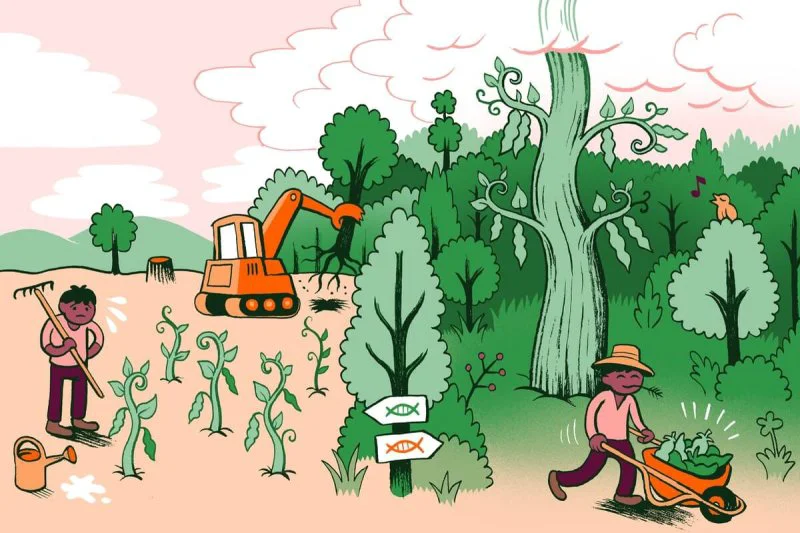Farming sustainability study: What climate benefits could widespread adoption of genetically modified crops bring to Europe?
Farming sustainability study: What climate benefits could widespread adoption of genetically modified crops bring to Europe?


Genetically modified (GM) crops can help reduce agricultural greenhouse gas (GHG) emissions. In addition to possible decreases in production emissions, GM yield gains also mitigate land-use change and related emissions. Wider adoption of already-existing GM crops in Europe could result in a reduction equivalent to 7.5% of the total agricultural GHG emissions of Europe.
The public debate about GM crops and new genomic breeding technologies remains contentious, especially in Europe. Critics focus primarily on hypothetical risks, while ignoring actual and potential benefits.
There is reason to be hopeful. As crop biotechnology research continues, a wider variety of traits will become available, each with different yield impacts.
Similar to [insect resistant] and [herbicide tolerant], GM crops tolerant to stressors such as drought and heat will improve effective yields through reduced crop damage.
Even larger yield increases might come from GM traits that improve yield potential through enhanced plant growth and photosynthetic efficiency.
New gene-editing technologies will likely further increase the diversity of desirable crop trait combinations [1]. Larger yield increases in more crops would lead to larger GHG emission reductions.
Hence, our estimate of 33 MtCO2e/y is only a small proportion of the potential future benefits of genomic breeding technologies for climate change mitigation.
This is an excerpt. Read the original post here.

 | Videos | More... |

Video: Nuclear energy will destroy us? Global warming is an existential threat? Chemicals are massacring bees? Donate to the Green Industrial Complex!
 | Bees & Pollinators | More... |

GLP podcast: Science journalism is a mess. Here’s how to fix it

Mosquito massacre: Can we safely tackle malaria with a CRISPR gene drive?

Are we facing an ‘Insect Apocalypse’ caused by ‘intensive, industrial’ farming and agricultural chemicals? The media say yes; Science says ‘no’
 | Infographics | More... |

Infographic: Global regulatory and health research agencies on whether glyphosate causes cancer
 | GMO FAQs | More... |

Why is there controversy over GMO foods but not GMO drugs?

How are GMOs labeled around the world?

How does genetic engineering differ from conventional breeding?
 | GLP Profiles | More... |

Alex Jones: Right-wing conspiracy theorist stokes fear of GMOs, pesticides to sell ‘health supplements’




 Viewpoint — Fact checking MAHA mythmakers: How wellness influencers and RFK, Jr. undermine American science and health
Viewpoint — Fact checking MAHA mythmakers: How wellness influencers and RFK, Jr. undermine American science and health Viewpoint: Video — Big Solar is gobbling up productive agricultural land and hurting farmers yet providing little energy or sustainabilty gains
Viewpoint: Video — Big Solar is gobbling up productive agricultural land and hurting farmers yet providing little energy or sustainabilty gains Trust issues: What happens when therapists use ChatGPT?
Trust issues: What happens when therapists use ChatGPT? Fighting deforestation with CO2: Biotechnology breakthrough creates sustainable palm oil alternative for cosmetics
Fighting deforestation with CO2: Biotechnology breakthrough creates sustainable palm oil alternative for cosmetics California, Washington, Oregon forge immunization alliance to safeguard vaccine access against federal undermining
California, Washington, Oregon forge immunization alliance to safeguard vaccine access against federal undermining 30-year-old tomato line shows genetic resistance to devastating virus
30-year-old tomato line shows genetic resistance to devastating virus The free-range chicken dilemma: Better for birds, but with substantial costs
The free-range chicken dilemma: Better for birds, but with substantial costs ‘You have to treat the brain first’: Rethinking chronic pain with Sanjay Gupta
‘You have to treat the brain first’: Rethinking chronic pain with Sanjay Gupta
